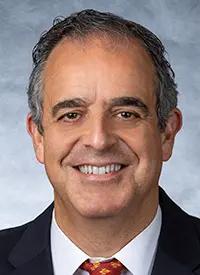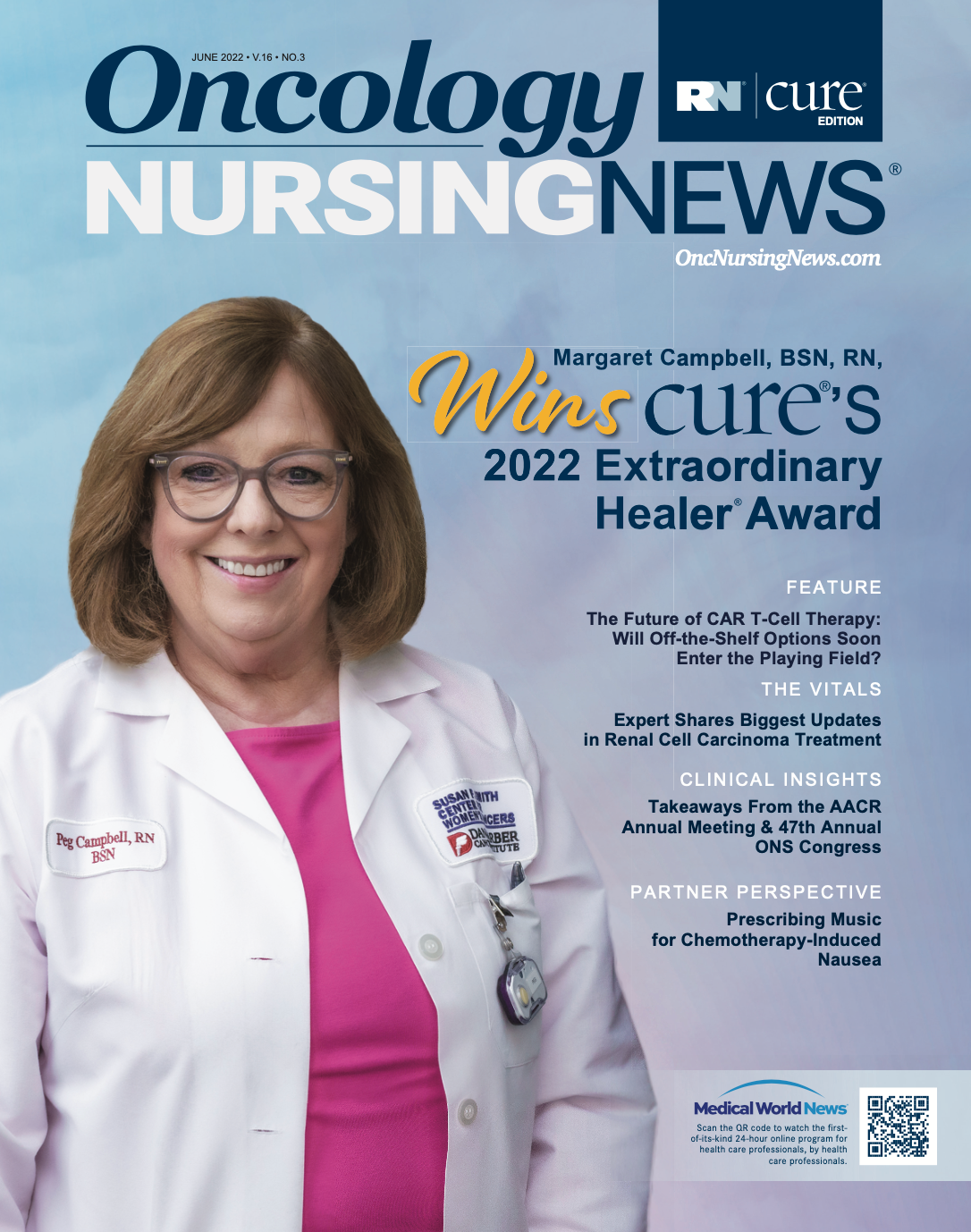A Quick Look at the 2022 AACR Annual Meeting
This year’s conference highlighted advances in natural killer cells, CD39 and KRAS G12C inhibitors, and CAR T-cell therapies.
Adding a Bispecific Antibody to Natural Killer Cells May Be Effective in Heavily Pretreated Lymphoma
The addition of the innate cell engager AFM13 to preactivated and expanded natural killer (NK) cells may represent an effective treatment for pretreated patients with advanced lymphoma, according to findings from a phase 1 study (NCT04074746) that were presented during the American Association for Cancer Research Annual Meeting 2022.1
Yago Nieto, MD, PhD

Results showed that patients experienced a median overall response rate of 89.5% (n = 17/19). Overall, 10 patients experienced complete responses and 7 experienced partial responses.2 Lead author Yago Nieto, MD, PhD, a professor in the Department of Stem Cell Transplantation, Division of Internal Medicine, at The University of Texas MD Anderson Cancer Center in Houston, discussed the findings during a news conference during the meeting. He said the study team was pleasantly surprised by the quality of tumor responses in patients with resistant lymphomas.
“This is the first clinical trial using off-theshelf cord blood–derived cytokine-induced memory-like ex vivo expanded NK cells precomplexed with the innate cell engager AFM13 construct to treat patients with CD30-positive relapsed/refractory Hodgkin lymphoma,” he said. “We saw very encouraging activity in this population of very heavily pretreated patients.”
References
- Nieto Y, Banerjee P, Kaur I, et al. Innate cell engager (ICE) AFM13 combined with preactivated and expanded cord blood (CB)-derived NK cells for patients with refractory/relapsed CD30+ lymphoma. Presented at: 2022 AACR Annual Meeting; April 8-13, 2022; New Orleans, LA. Abstract CTPL01.
Frontline TTX-030 Plus Budigalimab/ mFOLFOX6 Is Safe, Tolerable in Advanced Gastric/GEJ Cancer
Frontline treatment with TTX-030 plus budigalimab and modified FOLFOX6 (leucovorin calcium, fluorouracil, and oxaliplatin) was observed to be safe in patients with locally advanced or metastatic HER2- negative gastroesophageal junction (GEJ) adenocarcinoma, according to phase 1 findings recently presented at the American Association for Cancer Research Annual Meeting 2022.1
In addition, the anti-CD39 antibody yielded encouraging clinical activity across all participating populations, including patients with low PD-L1 combined positive scores. Investigators also observed that the combined therapeutic was linked to an increase of PD-L1 and CD8 T cells. Based on these data, investigators determined that TTX-030 can be safely combined with modified FOLFOX and anti–PD-1 agents and administered to patients, as long as there are no excessive or synergistic toxicities.
Zev A. Wainberg, MD

“TTX-030 in combination with budigalimab and modified FOLFOX6 for the treatment of patients with HER2-negative metastatic gastric cancer was well tolerated without excessive toxicities,” Zev A. Wainberg, MD, professor of medicine at University of California, Los Angeles (UCLA), and codirector of the UCLA GI Oncology Program, said in a presentation of the findings.
Reference
1. Wainberg ZA, Kang YK, Lee KW, et al. Efficacy and safety of TTX-030, an anti-CD39 antibody, in combination with chemoimmunotherapy for thefirst-line treatment of locally advanced or metastatic gastric/GEJ cancer. Presented at: 2022 AACR Annual Meeting; April 8-13, 2022; New Orleans, LA. Abstract CT015.
2-Year Follow-up Showcases Sotorasib Benefit in KRAS G12C+ NSCLC
Patients with KRAS G12C–mutant non–small cell lung cancer (NSCLC) experienced an overall survival (OS) rate of 32.5% (95% CI, 25.0%-40.2%) following treatment with sotorasib (Lumakras), according to 2-year follow-up data from the phase 1/2 CodeBreaK 100 trial (NCT03600883) that were presented during the American Association for Cancer Research Annual Meeting 2022. 1,2
Grace K. Dy, MD

Additional results showed that the overall response rate achieved with sotorasib was 40.7% (95% CI, 33.3%-48.4%) and the disease control rate was 83.7% (95% CI, 77.3%-88.9%). Moreover, the median duration of response was 12.3 months (95% CI, 7.1-15.0), and 50.6% (95% CI, 37.4%-62.4%) of responders were in response for at least 12 months. The median progression-free survival was 6.3 months (95% CI, 5.3-8.2) and the median OS was 12.5 months (95% CI, 10.0-17.8). At 1 year, the OS rate was 50.8% (95% CI, 42.8%-58.2%).
“In this longest follow-up of patients on any KRAS G12C inhibitor, sotorasib demonstrated very meaningful and durable efficacy, as well as a safety profile [that was] consistent with what had been [previously] reported,” Grace K. Dy, MD, chief of thoracic oncology and professor of oncology at Roswell Park Comprehensive Cancer Center in Buffalo, New York, said in a news conference during the meeting.
References
- Dy GK, Govindan R, Velcheti V, et al. Long-term outcomes with sotorasib in pretreated KRASp.G12C-mutated NSCLC: 2-year analysis of CodeBreaK100. Presented at: 2022 AACR Annual Meeting; April 8-13, 2022, New Orleans, LA. Abstract CT008.
Investigators Inch Closer to Unlocking CAR T-Cell Therapy Potential in Solid Tumors
Patients with solid tumors experienced promising initial responses with the chimeric antigen receptor (CAR) T-cell therapy BNT211. Furthermore, the treatment yielded tolerable safety results, according to data from a phase 1 trial (NCT04503278) that were presented at the American Association for Cancer Research Annual Meeting 2022. 1
The trial of BNT211, consisting of a Claudin-6–targeting CAR T-cell product plus the CAR T-cell cell-amplifying RNA vaccine (CARVac), had an overall response rate (ORR) of 43% and an acceptable safety profile in 14 patients with relapsed/refractory testicular cancer, ovarian cancer, or other solid tumors.
“We found robust engraftment of CAR T cells in all patients, which translated into a very encouraging clinical benefit with an ORR of 43% and a disease control rate of 86%. CARVac really supports the T-cell engraftment and mediates expansion,” John Haanen, MD, PhD, of the Center for Cellular Therapy at the Netherlands Cancer Institute and professor of translational immunotherapy of cancer at Leiden University, said during his presentation.
References
- Haanen JB, Mackensen A, Koenecke C, et al. CT002 - BNT211: A Phase I trial to evaluate safety and efficacy of CLDN6 CAR-T cells and CARVac-mediated in vivo expansion in patients with CLDN6-positive advanced solid tumors. Presented at: American Association for Cancer Research Annual Meeting; April 8-13, 2022; New Orleans, LA. Abstract CT002.




